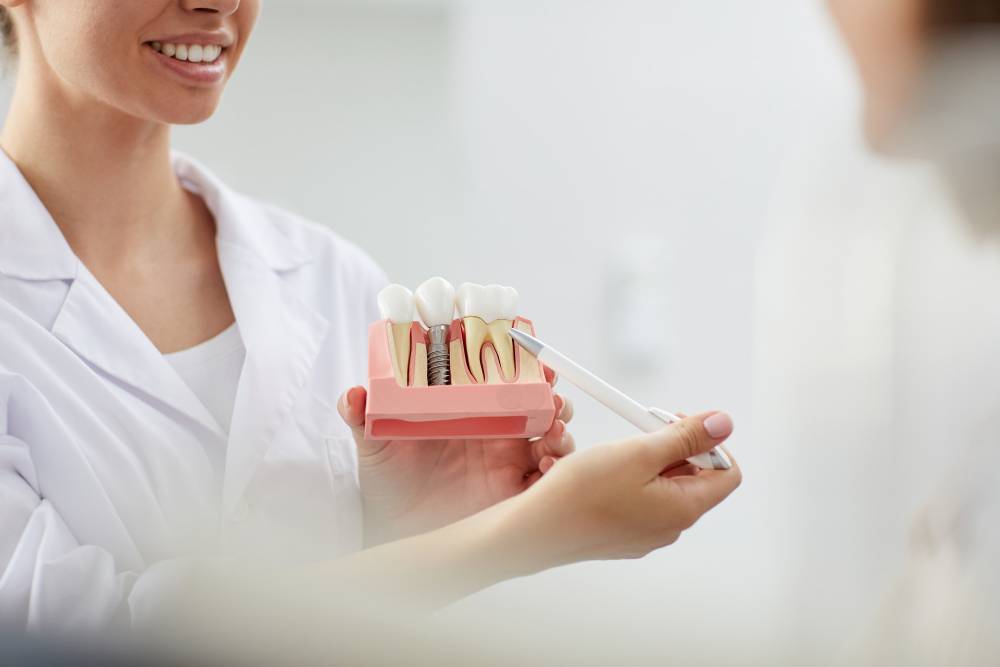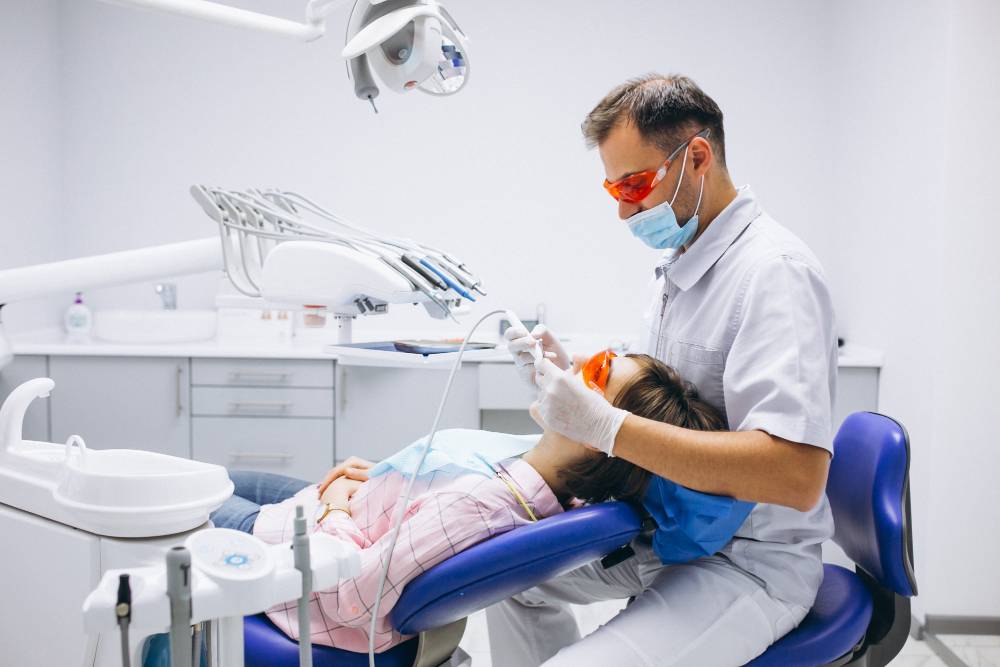Dental implants are one of the treatment options to replace missing teeth. Although the implant procedure is considered safe, there are still some risks and complications that one should be aware of.
If you’ve recently had a dental implant procedure, you may be wondering how to best care for your teeth in the days and weeks following surgery. This blog post will give you tips on how to care for your teeth and gums. Follow these guidelines, and you’ll be on your way to a healthy, confident smile!
What Is a Dental Implant?

An implant is a small post that replaces a tooth’s root within the jawbone. A dental implant is made from titanium used to support a dental prosthetic, such as a dental crown, dental bridge, or denture.
People who are missing a tooth, or several teeth, can benefit from dental implants. There are three kinds of dental implants: subperiosteal, endosteal, and zygomatic.
- Subperiosteal implants are placed below the gums but on top of the jawbone.
- Endosteal implants are placed directly in the jawbone.
- Zygomatic implants are placed in the cheekbone.
In addition to providing a replacement for a missing tooth that looks and feels like natural teeth, a dental implant also helps to preserve the health of the surrounding teeth. Because these implants are placed directly in the jawbone, they also help prevent the bone loss that can occur when a tooth is missing.
A dental implant is a reliable treatment option for tooth loss, and it can last many years with proper care. If you are considering undergoing implant surgery, make sure you are informed about what to expect before, during, and after the procedure.
What to Expect After Dental Implant Procedure
Dental implant surgery is a common procedure and is usually relatively straightforward. Most people don’t experience any major problems afterwards. However, it’s normal to have some minor side effects around the implant site. These should all resolve within a week or so. As a postoperative dental implant patient, you can expect to have:
- Minor bleeding
It’s normal to experience minor bleeding after surgery. This is because the dental implant procedure involves cutting into the gums and jawbone, which can damage small blood vessels. The bleeding is usually not severe and should stop within a few days. In rare cases, dental implant procedures can cause excessive bleeding that requires medical treatment. - Jaw stiffness
One possible side effect of a dental implant procedure is jaw stiffness. Jaw stiffness happens because dental implant surgery requires prolonged mouth opening, causing the muscles to become tight and difficult to move. Jaw stiffness is usually temporary and will resolve on its own with time. However, if it persists for more than a few weeks, you should consult your dentist. - Slight bruising
There’s usually some slight bruising after a dental implant procedure. This is because the implants are placed in the jawbone, and the dentist has to make an incision in the gums. The gum tissue is then stitched around the dental implant after its placement. The bruising is usually very mild and goes away within a few days. - Swelling
After a dental implant procedure, it is not uncommon to experience some swelling. This is because the surgery involves making an incision in the gum tissue and placing the implant in the bone. A person’s body responds to this trauma by producing inflammation, which can lead to swelling.
Swelling is most pronounced in the first few days after surgery but may persist for up to a week or longer. In some cases, the swelling may be more pronounced and last longer, but this is usually due to other factors such as infection or incorrect dental implant placement.If you are concerned about the amount of swelling you are experiencing after your surgery, please get in touch with your dentist. Their assessment will help you determine how to best manage the swelling.
- Pain and discomfort
After a dental implant procedure, it is normal to experience some pain and discomfort. It’s important to realize that dental implant surgery is quite an invasive and extensive treatment. An incision will be made in your gums, and the implant will be placed directly in your jawbone, which can cause some discomfort and swelling.
However, these symptoms should last only for a few days and can be managed with over-the-counter pain relief medication. You should consult your dentist if the pain persists after a week or if it worsens. They will be able to determine if there is an infection or another problem that must be addressed.After the implants are in place, you must follow your dentist’s advice on proper dental implant care to ensure longevity.
Tips for Dental Implants Aftercare
It is vital to look after your dental implants so that they last for many years. Here are some tips on how to take proper care of them:
- Brush your teeth twice a day, just as you would with natural teeth. Use a soft-bristled brush and avoid scrubbing too hard, which could damage the implant.
- Floss regularly to remove plaque, bacteria, and excess food particles around the implant.
- Maintain good oral hygiene practices and develop a consistent dental hygiene routine.
- Use an antibacterial mouthwash to help keep the area clean. You can also use warm salt water as a cleaning solution.
- Do not smoke. Smoking increases the risk of implant failure.
- Eat a healthy diet and avoid hard and sticky foods that could damage the implant or loosen the crown. Also, avoid spicy and acidic foods.
- Visit your dentist for follow-up appointments and schedule regular checkups and cleanings.
In addition, by knowing what activities and foods to avoid, you can ensure that your implants are well taken care of.
What Should I Avoid After the Dental Implant Procedure?

After having a dental implant procedure, it’s important to avoid certain activities to ensure the success of the implant. Here are some things to avoid:
- Eating hard or crunchy foods:
This can cause the implant to become dislodged or cause damage to the surrounding teeth. Stick to softer foods for at least a week after the procedure. - Smoking:
Smoking can delay healing and increase infection risk. It’s best to quit smoking altogether, but if you can’t, avoid smoking for at least a week after the procedure. - Brushing too hard:
It’s important to brush your teeth regularly after the procedure, but be gentle! Avoid brushing too hard. Do not use a toothbrush with hard bristles, as this can traumatise the implant site. - Drinking alcohol:
Alcohol consumption can delay healing and increase the risk of infection. Avoid drinking alcohol for at least one week after the procedure. - Using tobacco products:
Tobacco can delay healing and increase the risk of infection. Avoid tobacco products for at least 72 hours after the surgical procedure. - Strenuous exercise.
Strenuous activity can cause implant site bleeding. If the implant is not completely healed, strenuous exercise can cause the implant to loosen. It can also raise blood pressure, which can delay healing.
It’s crucial that you avoid putting too much pressure on the implant site. This means no clenching or grinding and no chewing on gum or any hard food. You can eat after surgery but be cautious of what you’re eating – and when.
How Long After Dental Implant Surgery Can I Eat?
The length of time a patient has to wait before eating after dental implant surgery varies depending on the individual case. The answer depends on the individual and how their recovery goes.
In general, however, it is recommended that dental patients wait at least 24 hours before eating anything other than soft foods. This gives the surgical site time to heal and helps to reduce the risk of infection.
After 24 hours, patients can slowly reintroduce other foods into their diet but should avoid anything too hard or chewy for at least a week to avoid further worsening complications such as jaw pain.
How Long Does Jaw Pain Last After Dental Implant?
Jaw pain after dental implant surgery typically subsides within a few days. However, everyone heals differently, so some people may experience discomfort for a week or so. If your pain is severe or lasts longer than a week, you should contact your dentist.
If you experience jaw pain after dental implant surgery, you can do a few things to help ease the discomfort.
- Ice packs can help to reduce swelling and inflammation. Apply an ice pack to the affected area for 15-20 minutes at a time, several times per day.
- Take any pain medication prescribed by your dentist or doctor. Over-the-counter pain relievers can also reduce discomfort after dental implant surgery.
- Keep your head elevated while you sleep to help reduce swelling.
- Follow all post-operative instructions from your dentist regarding how to care for the surgical site.
Taking these precautions can help ensure a speedy and comfortable recovery.
Can You Get a Dry Socket Following a Dental Implant?
A dry socket is a painful condition that can occur after a tooth is extracted. It happens when the blood clot that forms in the socket to protect the bone and nerve is dislodged or doesn’t form properly. This can expose the bone and nerves, leading to pain and infection.
While dry socket is more common after a wisdom tooth extraction, they can also occur following a dental implant. However, dry socket is relatively rare, occurring in less than 5% of cases. Pain medications and antibacterial mouthwashes are usually effective in treating them.
If you develop a dry socket after a dental implant, your dentist will likely prescribe a more potent antibiotic to help clear the infection. In most cases, the dry socket heals within a few weeks with no long-term complications.
Final Thoughts
After your dental implant surgery is complete, it’s important to follow all of your dentist’s detailed instructions on dental implant aftercare. This means brushing and flossing regularly, being especially careful when cleaning around the implant site, and avoiding hard and chewy foods for the first few weeks. Additionally, you should avoid tobacco products, which can cause irritation.
If you have any questions or concerns about post-operative care, book a consultation appointment through our website or call Comfort Care Dental at (08) 9516-2890. Our team of friendly and dedicated dentists will ensure that you have a smooth and easy dental implant recovery!
